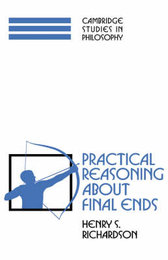
|
Practical Reasoning about Final Ends
Paperback / softback
Main Details
| Title |
Practical Reasoning about Final Ends
|
| Authors and Contributors |
By (author) Henry S. Richardson
|
| Series | Cambridge Studies in Philosophy |
|---|
| Physical Properties |
| Format:Paperback / softback | | Pages:344 | | Dimensions(mm): Height 215,Width 138 |
|
| Category/Genre | Ethics and moral philosophy |
|---|
| ISBN/Barcode |
9780521574426
|
| Classifications | Dewey:171.2 |
|---|
| Audience | | Professional & Vocational | |
|---|
| Illustrations |
Worked examples or Exercises
|
|
Publishing Details |
| Publisher |
Cambridge University Press
|
| Imprint |
Cambridge University Press
|
| Publication Date |
28 February 1997 |
| Publication Country |
United Kingdom
|
Description
How should we reason about what we do? The answer offered by most recent philosophy, as well as such disciplines as decision theory, welfare economics, and political science, is that we should select efficient means to our ends. However, if we ask how we should decide which ends or goals to aim at, these standard theoretical approaches are silent. Henry Richardson argues that we can determine our ends rationally. He constructs a rich and original theory of how we can reason about what to seek for its own sake as a final goal. Richardson defuses the counterarguments for the limits of rational deliberation, and develops interesting ideas about how his model might be extended to interpersonal deliberation of ends, taking him to the borders of political theory.
Reviews'This profound and important book challenges a common assumption about rationality: that all rational deliberation involves the selection of instrumental means to ends that are set by some non-rational process, for example by desires that are themselves impervious to reasoning. Drawing resourcefully on arguments of Aristotle and Plato, Richardson constructs an impressive account of the rationality involved in our selection and modification of our ultimate ends, and particularly of the ways in which a vague end can be more and more adequately specified by reflection. In the process, he offers the best account I have seen of the arguments for and against the claim that all values can be measured by a single common metric.' Martha Nussbaum, University of Chicago Law School
|